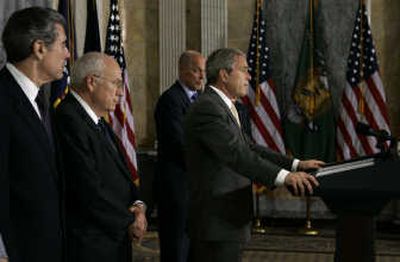Bush weighing tax cut for U.S. corporations

WASHINGTON – President Bush said Wednesday that he is considering a fresh plan to cut tax rates for U.S. corporations to make them more competitive around the world, an initiative that could further inflame a battle with the Democratic Congress over spending and taxes and help define the remainder of his tenure.
Advisers presented Bush with a series of ideas to restructure corporate taxes, possibly eliminating narrowly targeted breaks to pay for a broader, across-the-board rate cut. In an interview with a small group of journalists afterward, Bush said he was “inclined” to send a corporate tax package to Congress, although he expressed uncertainty about its political viability.
The president’s comments came as he tried to calm volatile stock and mortgage markets and reassure the country that the economy is fundamentally strong. Despite mounting concern over the downturn in the housing market, he rejected proposals advanced by prominent Democrats to grant government-chartered Fannie Mae and Freddie Mac more freedom to buy mortgages and mortgage-backed securities. And he ruled out any taxpayer bailout of lenders threatened by the subprime home-loan crisis.
In a 48-minute conversation on an array of economic issues, Bush also warned China not to start a trade war, blamed Congress for not doing more to shore up infrastructure such as the bridge that collapsed in Minneapolis last week and pushed back against Democratic presidential candidates who are promising to renegotiate the North American Free Trade Agreement.
The focus on economic issues on Bush’s last day in Washington before leaving today for most of the rest of the month reflected a White House strategy to confront Democrats on tax and spending issues. With most of his second-term domestic legislative agenda in tatters and his strategy in Iraq under bipartisan fire, Bush appears eager to return to familiar issues that animated the beginning of his presidency and might rally disaffected Republicans behind him again.
On another topic, Bush vowed to veto bipartisan legislation that would sharply increase funding for a popular health insurance program for poor children.
Asked by a reporter if he’d veto legislation that increases funding for the State Children’s Health Insurance Reauthorization Act, called SCHIP, Bush answered while the question was still being asked.
“If SCHIP is used to expand the nationalization of health care, I will veto it,” he said. He said he’d proposed increasing SCHIP funding in his budget, but by much less than Congress wants.
Bush proposed a $5 billion increase over five years. Last week the House voted 225-204 for a $50 billion increase over five years, and the Senate voted 68-31 for a $35 billion increase over five years. The Senate margin would override a veto, but the House’s wouldn’t. The two versions must be reconciled before Congress sends the measure to Bush for his signature or veto.